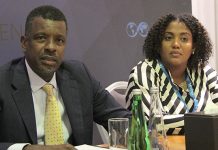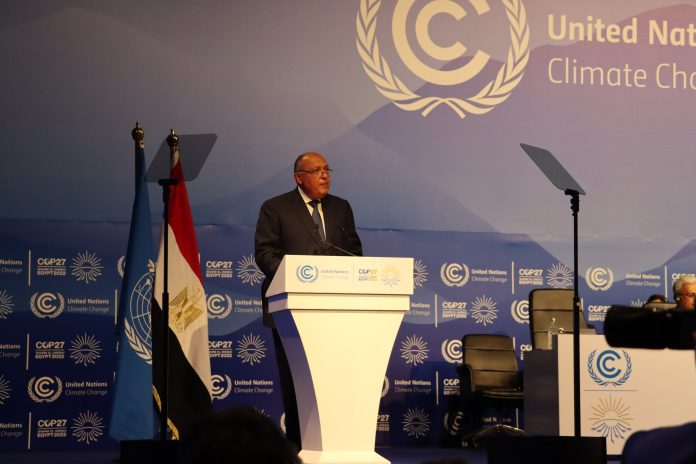The UN Climate Change Conference in Sharm el-Sheik, Egypt, should shift the world towards implementation of previously agreed plans to tackle humanity’s greatest challenge, Simon Stiell, the new Executive Secretary of the UN Climate Convention (UNFCCC), said on Sunday at the opening of COP27.
“Today a new era begins – and we begin to do things differently. Paris gave us the agreement. Katowice and Glasgow gave us the plan. Sharm el-Sheik shifts us to implementation. No one can be a mere passenger on this journey. This is the signal that times have changed,” Stiell told delegates gathered in the main plenary room of the Tonino Lamborghini International Convention Centre.
The UN climate chief said leaders –be they Presidents, Prime Ministers or CEOs – would be held to account for promises they made last year in Glasgow.
“Because our policies, our businesses, our infrastructure, our actions, be they personal or public, must be aligned with the Paris Agreement and with the [UN Climate] Convention”, he underscored.
The UNFCCC convention entered into force on 21 March 1994 to prevent “dangerous” human interference with the climate system. Today, ratified by 198 countries, it has near-universal membership. The Paris Agreement, agreed in 2016, works as an extension of that convention.
Acknowledging the current complex geopolitical situation, Stiell said that COP27 is an opportunity to create a safe political space, shielded from whatever is going on “out there”, to work and deliver world change.
“Here in Sharm el-Sheikh, we have a duty to speed up our international efforts to turn words into actions”, he emphasized.
The UNFCCC Executive Secretary underlined three critical lines of action for the Conference:
1.Demonstrate a transformation shift to implementation by putting negotiations into concrete actions.
2.Cement progress on the critical workstreams – mitigation, adaptation, finance and crucially – loss and damage.
3. Enhance the delivery of the principles of transparency and accountability throughout the process.
“I welcome detailed plans on how we deliver what we have promised”, he told delegates.
Stiell, dubbing himself an “accountability chief”, stated that 29 countries have now come forward with tightened national climate plans since COP26, five more since the publication of last week’s UNFCCC NDC Synthesis report, but still not a majority.
“So here I am now, looking out at 170 countries that are due to be revisiting and strengthening their national pledges this year,” he said.
He reminded delegates that last year the Glasgow Climate Pact was agreed at COP26, and he expected them not to rescind their word.
“Stick to your commitments. Build on them here in Egypt. I will not be a custodian of back-sliding,” he said.
In words that drew an ovation in the plenary room, the UN climate chief underscored that women and girls must be placed at the centre of climate decision-making and action.
“Their empowerment leads to better governance and better outcomes,” he said, also highlighting the importance of civil society organisations and the youth in the COP27 process.
Alok Sharma, President of COP26 representing the United Kingdom, passed the baton officially to the new Egyptian President, Sameh Shoukry, during the opening plenary.
Sharma reviewed the achievements made at Glasgow last year, such as finalising the so-called Paris Rulebook – the the guidelines for how that Agreement is delivered – and making stronger finance commitments.
“The UN Secretary-General has said ‘our shared long-term futures do not lie in fossil fuels’, and I agree with him, wholeheartedly”, he said.
According to the COP26 President, if all commitments made last year, including the net-zero pledges, were to be implemented, the world would be on a path to 1.7 degrees Celsius warming by the end of the century.
“Still not 1.5C, but progress,” he said, recognising the scale of the challenge that the world is facing.
Echoing Stiell, he urged leaders to act, despite current geopolitical challenges.
“As challenging as our current moment is, inaction is myopic, and can only defer climate catastrophe, we must find the ability to focus on more than one thing at once”, he urged.
SOURCE: UN NEWS CENTRE/PACNEWS














